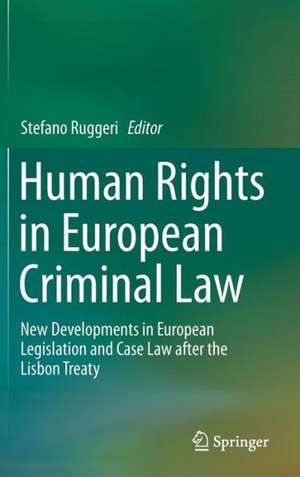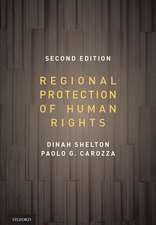Human Rights in European Criminal Law: New Developments in European Legislation and Case Law after the Lisbon Treaty
Editat de Stefano Ruggerien Limba Engleză Hardback – 19 ian 2015
| Toate formatele și edițiile | Preț | Express |
|---|---|---|
| Paperback (1) | 641.85 lei 6-8 săpt. | |
| Springer – 24 sep 2016 | 641.85 lei 6-8 săpt. | |
| Hardback (1) | 642.65 lei 6-8 săpt. | |
| Springer International Publishing – 19 ian 2015 | 642.65 lei 6-8 săpt. |
Preț: 642.65 lei
Preț vechi: 756.06 lei
-15% Nou
122.99€ • 133.54$ • 103.31£
Carte tipărită la comandă
Livrare economică 23 aprilie-07 mai
Specificații
ISBN-10: 3319120417
Pagini: 300
Ilustrații: X, 317 p.
Dimensiuni: 155 x 235 x 25 mm
Greutate: 0.64 kg
Ediția:2015
Editura: Springer International Publishing
Colecția Springer
Locul publicării:Cham, Switzerland
Public țintă
ResearchCuprins
Textul de pe ultima copertă
Caracteristici
Descriere
This book deals with human rights in European criminal law after the Lisbon Treaty. Doubtless the Lisbon Treaty has constituted a milestone in the development of European criminal justice. Not only has the reform following the Treaty given binding force to the EU Charter of Fundamental Rights, but furthermore it has paved the way for unprecedented forms of supranational legislation. In this scenario, the enforcement of individual rights in criminal matters has become a core goal of EU legislation. Alongside these developments, new interactions between national and supranational jurisprudences have emerged, which have significantly contributed to a human rights-oriented approach to European criminal law. The book analyses the main developments of this complex phenomenon from an interdisciplinary perspective. Criminal and procedural law, constitutional law and comparative law must thus be combined to achieve a full understanding of these developments and of their impact on national law.

















